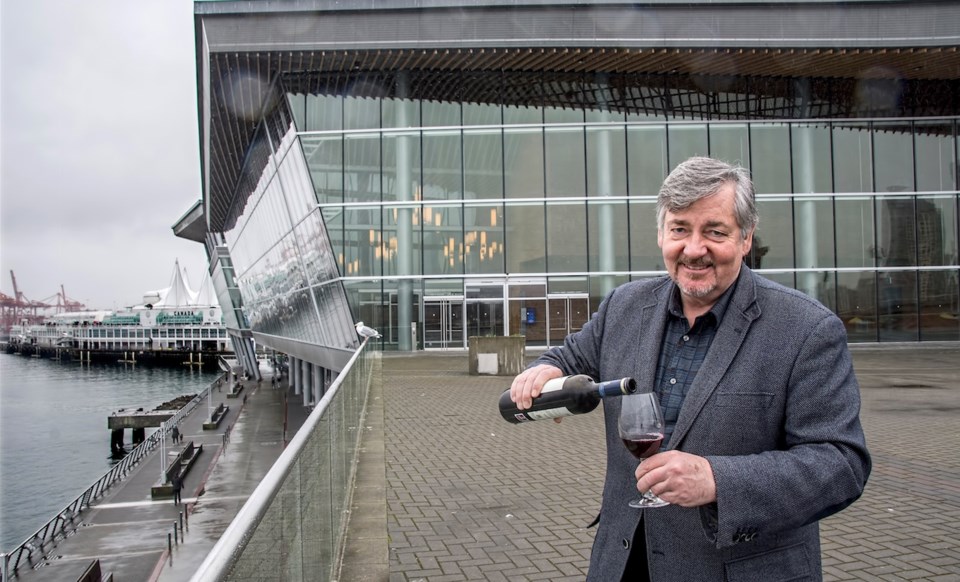Event organizers in B.C. are planning larger gatherings thanks to fewer serious COVID-19 infections, and the B.C. government lifting health restrictions.
The pandemic is continuing, however, to exact a toll on Vancouver International Wine Festival (VIWF) logistics.
For example, wine tasters at this year’s three evening tastings at the Vancouver Convention Centre will have more space than ever to mingle and chat with representatives of 101 wineries from 14 countries.
Pre-pandemic, capacity at those events was 2,500 attendees per night. This year, the festival is cutting that down to between 1,000 and 1,250 people per night for the May 19, 20 and 21 public tastings, festival director Harry Hertscheg told BIV.
“You will never have more elbow room than at this year's festival,” he said.
“We decided to just go to 50 per cent capacity at the tasting room because of the supply chain issues, and various challenges.”
Hertscheg’s team started planning the 2022 festival last summer, and it seemed practical at the time to assume the VIWF would have to operate at a reduced capacity, he said.
The event is normally held in February, but Hertscheg pushed it ahead to May to give the pandemic, and health restrictions, more time to subside.
That move now appears prescient, given that:
- Canada plans on April 1 to lift its requirement that travellers entering the country show proof of negative COVID-19 tests;
- B.C. lifted its mandate that people wear masks in indoor public settings on March 11; and
- B.C. on April 8 plans to lift its mandate that restaurants, sports arenas and other venues require attendees to show their BC Vaccine Cards.
Hertscheg said his festival may still require attendees to show vaccine cards.
“We’re not currently confirming any steps regarding the vaccine cards, until after it is fully lifted,” he said. “With the new [BA.2] variant coming, it’s folly to speculate exact procedures or policies for mid-May.”
His preference would have been for the B.C. government to keep its vaccine card requirement in place for the festival, because exhibitors, volunteers and venue operators have told him that the cards make them feel safer.
Pandemic has wide-ranging effect on event organizers
The pandemic has also affected the VIWF in the way that it prompted supply-chain challenges, which sent shipping costs soaring, and led to some wines being in short supply.
Hertscheg said that had the VIWF stuck to its February timeframe, he might have had to ask wineries to pull stock from their holiday-season supplies in order to ensure that their wines would be available for the festival.
“That would have made me the most unpopular person in town,” he said.
Fewer people at the main tasting events mean that winery owners only need to allot four to five cases of their wines for the three public events, and the three industry-only tastings, and not the eight to 10 cases of wines that they normally would have had to set aside.
The VIWF is much more than its convention centre tastings.
In pre-pandemic times, the festival had 54 events, including restaurant dinners, stand-up grazing events, seminars and themed tastings with panels of experts.
Its marquee event has long been its gala dinner and auction, and that event will take place on May 17 at the Fairmont Hotel Vancouver.
This year, the festival is likely to have 27 events, with capacity at the dinners and seminars being similar to past years. Tickets go on sale April 6, with the schedule for events set to be finalized at least a day or two prior, Hertscheg said.
Festivalgoers will be able to attend the same number of events as they previously did, but they will have less choice in each time slot. In previous years, attendees might have been able to choose between four or five events held simultaneously. This year, they may only have the option of one or two events held at the same time.
VIWF proceeds go to the not-for-profit Shakespeare festival Bard on the Beach. In 2020, the VIWF generated about $220,000 for Bard on the Beach, whereas this year Hertscheg said he is aiming for the festival to break even, and, if things go well, to generate about $100,000 for the theatre company.
COVID-19 also affected festival planning in that the pandemic’s unpredictability meant that organizers could not reliably plan for one country to be the festival’s theme region. The result is that there is no theme region, nor a theme style of wine.
With 41 B.C. wineries set to attend the festival, the province is the region with the most representation. Another 18 wineries are coming from Italy, while 14 are from the U.S.
For the first time in the festival’s 43-year history, a winery from the country of Georgia will attend.
Hertscheg said its participation provided the challenge of finding a Georgian flag to post in the tasting room alongside flags of other participating countries.
“The price of flags has gone way up, but it's an important expense to make sure that we have a flag from every participating country,” he said.



